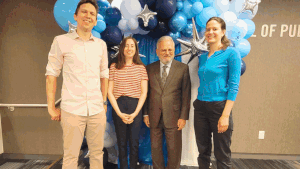Advocacy conducted by physicians is an essential force in advancing health equity. To assess facilitators and barriers to physician advocacy, CUNY SPH researchers examined the extent and nature of advocacy engagement among physician alumni from a reproductive health advocacy training program.
The team surveyed 231 alumni of the Physicians for Reproductive Health’s Leadership Training Academy and conducted 36 in-depth interviews with a subset of respondents purposively selected to ensure varied backgrounds. It assessed their involvement in various advocacy activities such as legislative policy, media, professional organizations, and medical education. A significant portion of the alumni were actively engaged in legislative policy (39%), professional organizations (42%), and medical education (39%), though less so in media-based advocacy (23%).
Factors promoting advocacy engagement included passion, urgency, confidence, and the program’s emphasis on diverse forms of advocacy. Challenges included lack of time, safety concerns, and their perceptions around redundancy of efforts.
The community fostered by the program was crucial, especially supporting visible advocacy efforts and those in hostile environments towards abortion care. Alumni in these environments were more likely to engage in media advocacy when they reported a strong sense of community support from the program and its alumni.
“One of the successes of the Leadership Training Academy that we identified in this study was its emphasis on the many different forms of advocacy, allowing physicians to choose advocacy efforts that align with their skills and life circumstances,” says author and Associate Professor Heidi Jones. “Further, our study findings suggest that community-building is a critical part of physician advocacy training especially for public-facing advocacy for health services such as abortion care that may be met with hostility.”
The authors conclude that physician advocacy training curricula should include both skills- and community-building and identify a full range of forms of advocacy. Community-building is especially important for physician advocacy for reproductive health services such as abortion care.




